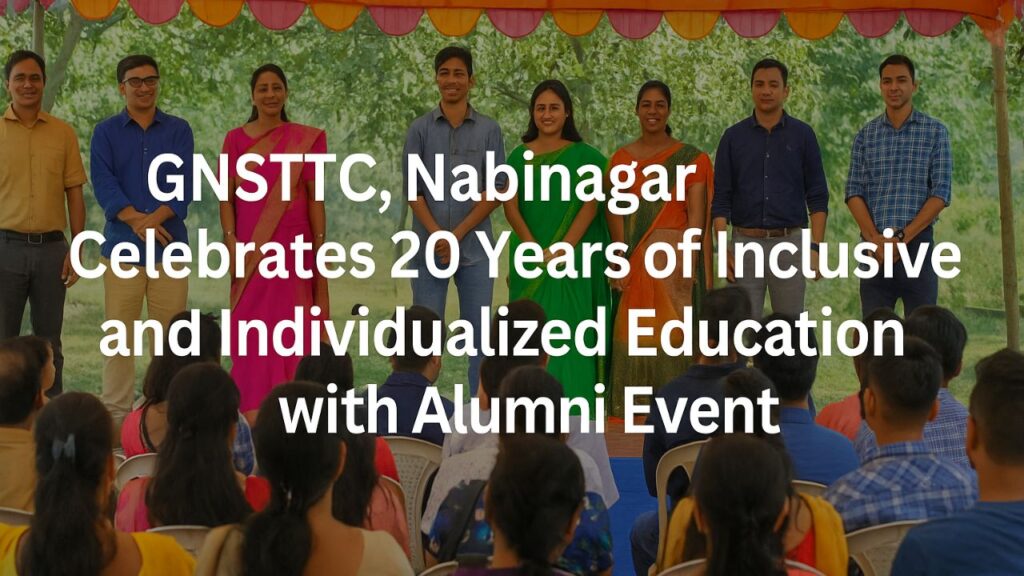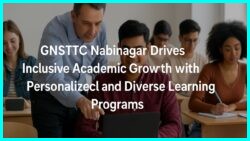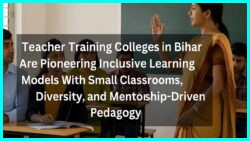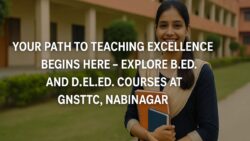Inclusive and Individualized Education – The Golden Jubilee milestone for any institution is a moment of pride, reflection, and celebration. GNSTTC (Gyan Niketan Shiksha Teacher Training College), Nabinagar, marked a remarkable 20-year journey of nurturing future educators through inclusive and individualized teaching approaches. The institution hosted a grand alumni meet and cultural event to commemorate two decades of shaping minds and communities. This article explores the highlights of the anniversary celebration, the unique academic model of GNSTTC, and how the institution has transformed lives through its commitment to inclusive teacher education.
20 Years of Transformative Education: A Journey Worth Celebrating
GNSTTC, Nabinagar began its journey in 2005 with the aim of empowering rural and semi-urban youth through professional teacher training programs. The college’s approach emphasized inclusivity, accessible education, and student-centric pedagogy from the beginning.
- Founded in 2005 with B.Ed. and D.El.Ed. courses
- Focus on underrepresented rural students and female enrollment
- Over 3,000 trained teachers placed across Bihar and neighboring states
- Accredited and affiliated with top educational bodies
The 20th anniversary celebration not only brought back alumni from different batches but also served as a testament to the institution’s strong foundation and evolving excellence.
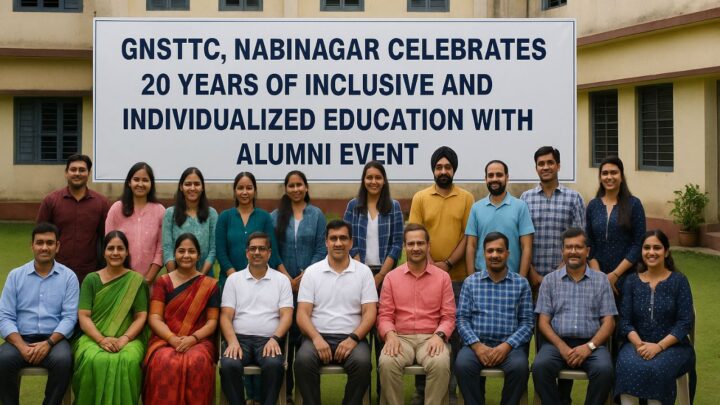
Highlights of the Alumni Event 2025
Held on the campus grounds in July 2025, the alumni event saw participation from over 600 past students, current faculty, educationists, and community leaders. It was a joyful convergence of memories, mentorship, and motivation.
Key Moments from the Celebration:
- Welcome Procession: Traditional welcome by current students with music, flowers, and folk performances.
- Inaugural Ceremony: Hosted by the Director, with lighting of the lamp and a keynote address on “Inclusive Education for New India.”
- Alumni Reflections: Inspirational stories from past students working as headmasters, principals, and education consultants.
- Cultural Program: Performances of local art forms and stage plays on the theme of ‘Education as Empowerment.’
- Campus Tour: Alumni explored new smart classrooms, digital labs, and community learning centers.
- Networking Dinner: Faculty and alumni discussed ways to contribute to institutional development and rural outreach.
GNSTTC’s Model of Inclusive & Individualized Learning
One of the pillars of GNSTTC’s success has been its adaptive and humanistic teaching philosophy. Over the years, it has integrated best practices from NEP 2020 and localized learning techniques.
Features of GNSTTC’s Teaching Approach:
- Inclusive Curriculum: Tailored to accommodate students from marginalized and tribal backgrounds
- Language Support: Bilingual instruction in Hindi and English for ease of understanding
- Peer Mentoring: Batch-wise mentor-mentee systems to support struggling learners
- Technology Integration: Use of smartboards, e-content, and video modules
- Field Exposure: Internships in local schools, NGOs, and child development centers
This approach ensures that students are not only exam-ready but also field-ready and socially aware.
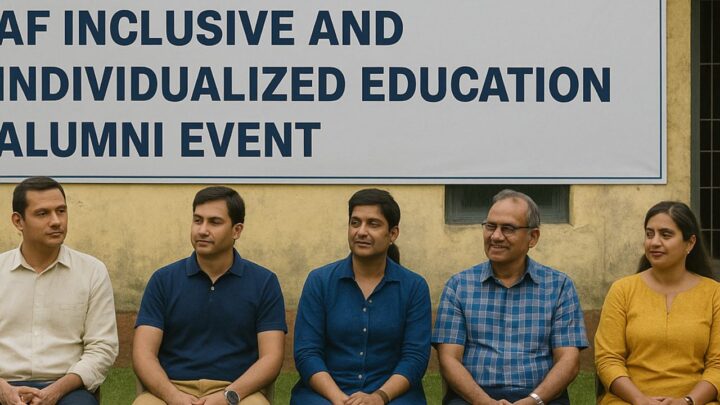
Recent Infrastructure and Academic Upgrades
In its 20th year, GNSTTC has expanded its offerings and enhanced its facilities with support from government and alumni funding.
| Upgrade Type | Description | Year Completed | Impact on Learning |
|---|---|---|---|
| Smart Classrooms | Interactive boards, projectors, and audio-video tools | 2023 | Boosts visual learning |
| Language Lab | Pronunciation software and linguistic tools | 2024 | Improves communication |
| Women’s Hostel | 100-bed capacity with hygienic food and Wi-Fi | 2022 | Promotes female access |
| Library Expansion | Added 5000+ new titles and digital resources | 2023 | Enhances research |
| ICT Training Center | Special ICT training for aspiring teachers | 2024 | Builds tech-readiness |
| Solar Power Facility | Eco-friendly campus with sustainable electricity supply | 2023 | Reduces carbon footprint |
These upgrades reflect GNSTTC’s commitment to remain a progressive center of teacher education.
Community Impact and Alumni Contributions
Beyond academics, GNSTTC’s legacy lies in its outreach. Over the years, the institution has facilitated programs in adult literacy, girl child education, and teacher awareness in backward districts.
Some Notable Alumni Contributions:
- Neha Kumari (Batch 2010): Runs a foundation for girl child education in Aurangabad.
- Rajeev Tiwari (Batch 2012): Appointed Education Officer in Bihar’s Munger district.
- Salma Parveen (Batch 2015): Introduced inclusive education in Urdu-medium schools in Gaya.
Such stories are testaments to how GNSTTC-trained teachers are change-makers in their own communities.
The Vision Ahead: GNSTTC 2030
Looking ahead, GNSTTC has a clear roadmap to become a model college for teacher training in Eastern India. The management outlined their vision during the alumni event.
Future Plans:
- Start an M.Ed. program by 2026
- Partner with EdTech firms for digital certifications
- Launch online learning platforms for remote teacher training
- Expand outreach to Jharkhand and Chhattisgarh
- Establish a ‘Center for Inclusive Pedagogy’ by 2028
These goals align with India’s broader focus on education reform, digital empowerment, and skill-based teaching under NEP 2020.
The 20-year milestone of GNSTTC, Nabinagar is more than just a celebration—it is a reaffirmation of its mission to build compassionate, capable, and community-rooted educators. With continuous innovation, inclusive values, and alumni support, the next decade promises even greater impact in shaping the educational landscape of rural India.
FAQs
Q1. What courses does GNSTTC offer currently?
GNSTTC offers B.Ed. and D.El.Ed. teacher training programs, both approved by NCTE.
Q2. Who can apply for admission at GNSTTC?
Any graduate with a minimum required percentage and interest in teaching can apply. Preference is given to local and female candidates.
Q3. Is there a hostel facility available?
Yes, GNSTTC has a dedicated women’s hostel with all necessary facilities and security.
Q4. What is the admission process for 2025-26?
Admissions are conducted through an entrance test followed by counseling and document verification.
Q5. How can alumni contribute to the college’s growth?
Alumni can mentor current students, donate to the development fund, or partner in rural education outreach programs.
How has GNSTTC Nabinagar maintained inclusive education for 20 years?
By hosting alumni events and providing individualized education.
What activities were included in GNSTTC Nabinagar's alumni event?
Various activities, networking opportunities, and celebrations were part of the event.
What impact has GNSTTC Nabinagar's individualized education approach had on alumni?
It has positively influenced alumni's educational experiences and career paths.

